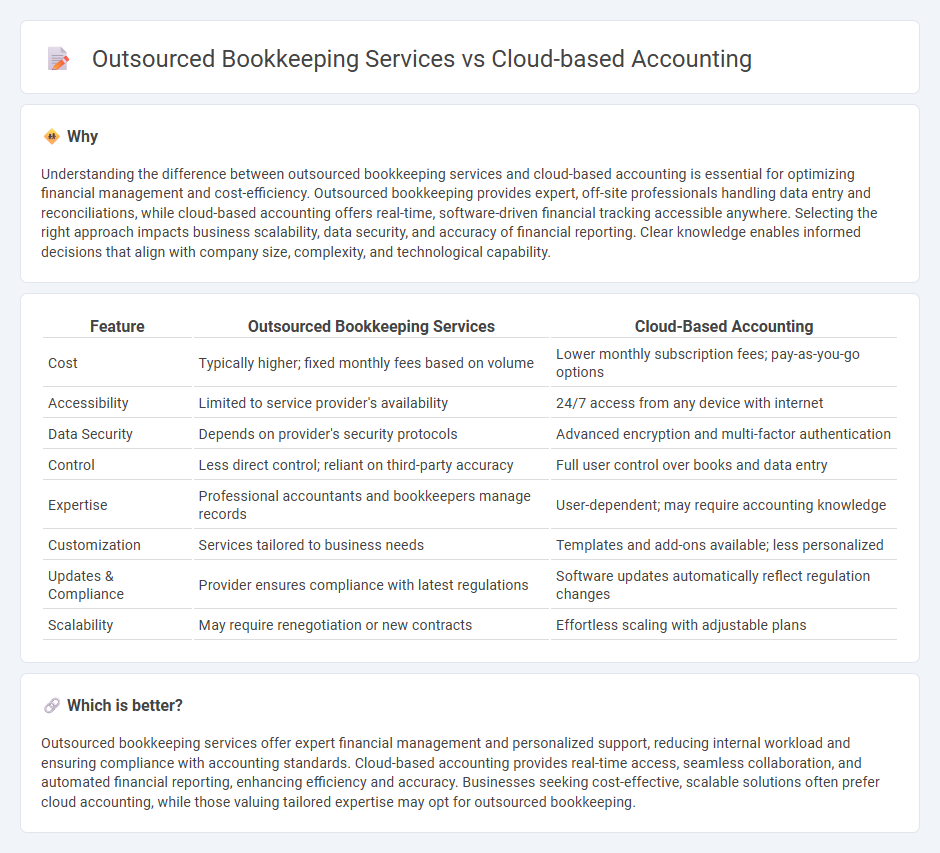
Outsourced bookkeeping services provide expert financial record management by external professionals, ensuring accuracy and compliance while freeing internal resources. Cloud-based accounting platforms enable real-time access to financial data, automate processes, and enhance collaboration through online tools. Explore detailed comparisons to determine the best solution for your business needs.
Why it is important
Understanding the difference between outsourced bookkeeping services and cloud-based accounting is essential for optimizing financial management and cost-efficiency. Outsourced bookkeeping provides expert, off-site professionals handling data entry and reconciliations, while cloud-based accounting offers real-time, software-driven financial tracking accessible anywhere. Selecting the right approach impacts business scalability, data security, and accuracy of financial reporting. Clear knowledge enables informed decisions that align with company size, complexity, and technological capability.
Comparison Table
| Feature | Outsourced Bookkeeping Services | Cloud-Based Accounting |
|---|---|---|
| Cost | Typically higher; fixed monthly fees based on volume | Lower monthly subscription fees; pay-as-you-go options |
| Accessibility | Limited to service provider's availability | 24/7 access from any device with internet |
| Data Security | Depends on provider's security protocols | Advanced encryption and multi-factor authentication |
| Control | Less direct control; reliant on third-party accuracy | Full user control over books and data entry |
| Expertise | Professional accountants and bookkeepers manage records | User-dependent; may require accounting knowledge |
| Customization | Services tailored to business needs | Templates and add-ons available; less personalized |
| Updates & Compliance | Provider ensures compliance with latest regulations | Software updates automatically reflect regulation changes |
| Scalability | May require renegotiation or new contracts | Effortless scaling with adjustable plans |
Which is better?
Outsourced bookkeeping services offer expert financial management and personalized support, reducing internal workload and ensuring compliance with accounting standards. Cloud-based accounting provides real-time access, seamless collaboration, and automated financial reporting, enhancing efficiency and accuracy. Businesses seeking cost-effective, scalable solutions often prefer cloud accounting, while those valuing tailored expertise may opt for outsourced bookkeeping.
Connection
Outsourced bookkeeping services leverage cloud-based accounting platforms to provide real-time access to financial data, ensuring accuracy and timely updates. These cloud solutions enable seamless collaboration between businesses and external accountants, enhancing efficiency and reducing costs. Integration of cloud technology with outsourced bookkeeping facilitates scalable, secure, and automated financial management processes.
Key Terms
Automation
Cloud-based accounting offers seamless automation through real-time data synchronization, AI-driven invoice processing, and integrated financial reporting tools, enhancing accuracy and efficiency. Outsourced bookkeeping services combine human expertise with automation software to manage transactional data and compliance, providing tailored financial insights while reducing manual errors. Explore how automation transforms financial management by leveraging cloud solutions or expert outsourcing.
Data Accessibility
Cloud-based accounting offers real-time data accessibility from any device with internet connectivity, enabling businesses to monitor finances instantly and collaborate with multiple users simultaneously. Outsourced bookkeeping services provide data access through secure client portals but may involve delays in updating records due to reliance on external schedules and communication. Explore further to understand which option best enhances your financial data accessibility.
Cost Structure
Cloud-based accounting offers scalable subscription pricing, reducing upfront software investment and enabling real-time access to financial data. Outsourced bookkeeping services typically involve fixed monthly fees based on transaction volume and complexity, often including expert human oversight and customized reporting. Explore detailed cost comparisons to determine the best solution for your business needs.
Source and External Links
Cloud Accounting: What It Is, How It Works And Its Benefits - This article explains how cloud-based accounting works by utilizing secure web-based software to streamline business processes and enhance collaboration and financial reporting.
Cloud Based Accounting: What is It and Why You Need It - This resource details cloud accounting software as a Software-as-a-Service (SaaS) model, offering flexibility, real-time updates, and cost efficiency compared to traditional methods.
How Cloud Computing Accounting Is Changing the Industry - This blog post discusses how cloud computing accounting enables real-time access to financial data, automates tasks, and enhances collaboration, signaling innovation and modernization in the field.
 dowidth.com
dowidth.com